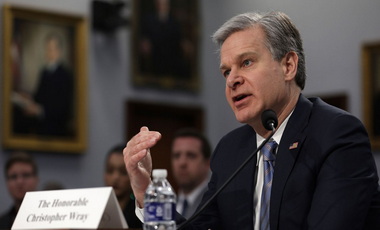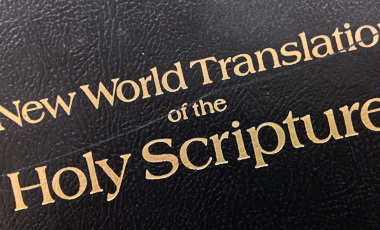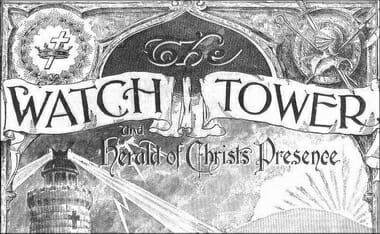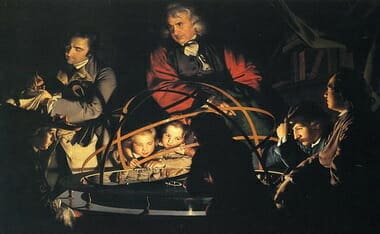PAGES 118-119
On page 776 of the Appendix the New World Translation translators quote from the recognized authority, A. T. Robertson, in support of their “a god” rendering: “Among the ancient writers ho theos was used of the god of absolute religion in distinction from the mythological gods.”32 (Supposedly proving that God with the definite article is to be distinguished from God without the article.) What the translators failed to include was Robertson’s further statement: “In the N. T. however, while we have pros ton theon (John 1:1, 2), it is far more common to find simply theos, especially in the Epistles.”33
On pages 774 and 775 the translators quote Dana and Mantey who they misuse, as a check of these citations demon-strate.34
To this evidence also may be added the weight of the great majority of the translations and versions now in existence, as well as almost every recognized Greek scholar. The writer has checked over twenty translations as well as many commentaries based on the Greek, and in every case (except for Moffatt’s and Goodspeed’s readings) the translation “the Word was God” or its equivalent was found.35
One of the strongest arguments against the New World Translation reading is the fact that such a reading would be absolutely abominable to the Jewish ear. The Jews were strict monotheists and to accept the Witnesses’ translation would make John guilty of polytheism. The New Testament makes it clear that the believers were worshipping Christ (Matt. 14:83; 28:9, 17; John 20:28).36
On page 107, the Jehovah’s Witnesses introduce four more verses, three of which are wrongly understood. The argument is as follows: (1) “Psalm 90:2 declares that God is `from everlasting to everlasting’.” (2) If this is true Jesus could not be God for He had a beginning. (3) Proof that Jesus Christ did have a beginning is found in Revelation 3:14; John 1:14; and Colossians 1:15.
Revelation 3:14 is quoted according to the New World Translation rendering which makes Christ “the beginning of the creation by God.” On the surface this verse seems to say that Christ was God’s first creation, but an examination of the scripture shows this understanding is not acceptable. The first thing which is erroneous is the translation of the verse. The translation “by God” cannot be justified, for the genetive tou theou, means “of God” and not “by God.” For the translation given by the Witnesses the genitive would require the proposition hupo, which is not found in the passage.37 The second word which is wrongly understood is the Greek word arche, translated “beginning.” Concerning
32 A. T. Robertson, A Grammar of the Greek New Testament in the Light of Historical Research (fourth edition; New York: George H. Doran Company, 1923), p. 761. Arndt-Gingrich state that then is used of “the true God, sometimes with, sometimes without the article.” Arndt-Gingrich, op. cit., p. 357.
33 Robertson, loc. cit.
34 Cf. H. E. Dana and Julius R. Mantey, A Manual Grammar of the Greek New Testament (New York: The Macmillian Company, 1955), pp. 140, 148, 149. See Dr. Mantey’s own reaction in M. Van Buskirk’s The Scholastic Dishonesty of The Watchtower (Canis, P.O. Box 1783, Santa Ana, Calif. 92702).
35 An interesting and informative presentation on the deity of Christ with special reference to John 1:1 and the Witnesses’ official reply is found in the article by Victor Perry, “Jehovah’s Witnesses and the Deity of Christ,” The Evangelical Quarterly, 35:15-22, January-March, 1963.
36 “For an excellent presentation on worship given to Christ see: Anthony A. Hoekema, The Four Major Cults (Grand Rapids: Wm. B. Eerdmans Publishing Company, 1963), pp. 889-44.
37 “Dana and Mantey, op. cit., p. 112: “In fact, agency is expressed with the aid of hupo more frequently than it is by all the other methods combined.”
Page 208-211
5. Arbitrary use and non-use of capitals when dealing with the divine name. The place where this is especially evident is John 1:1 where the New World Translation translates “the Word was a god.” According to the Witnesses’ argument “god” appears here without the article. If this is the rule that the Witnesses themselves establish, why are they not consistent? In John 1: 18, which is a parallel passage, why have they not translated it: “No man has seen a god,” as there is no definite article before “God”? The same might be asked concerning Romans 8:8; Philippians 2:6; and Philippians 2:11. It also causes one to wonder, if Christ is “god” with a little “g,” how, when Thomas in John 20:28 gives his great declaration of faith to Christ’s deity, does the NWT have “My Master and my God.” It can be seen that the theos in John 20:28 is with the definite article, but how can the translators apply both “god” and “God” to Christ in the same book?
Other reviewers’ comments on the New World Translation of the Christian. Greek Scriptures. What do qualified men say concerning this Watch Tower translation? What is the purpose of the translation?
Ray C. Stedman writes:
. . . A close examination, which gets beneath the outward veneer of scholarship, reveals a veritable shambles of bigotry, ignorance, prejudice, and bias which violates every rule of biblical criticism and every standard of scholarly integrity.42
Henry J. Heydt draws his conclusion:
“We consider the New World Translation a gross miscarriage of what a translation should be, and a biased travesty of God’s Holy Word.”43
Martin and Klann conclude their chapter on the New World Translation with the following comments:
Once it is perceived that Jehovah’s Witnesses are only interested in what they can make the Scriptures say, and not in what the Holy Spirit has already perfectly revealed, then the careful student will reject entirely Jehovah’s Witnesses and their Watchtower translations.44
F. E. Mayer shows the purpose of the translation as he writes:
The New World Translation sets forth other distinctive views which are essential to the entire doctrinal structure of the witnesses’ message. It is a version that lends support to the denial of doctrines which the Christian churches consider basic, such as the co-equality of Jesus Christ with the Father, the personhood of the Holy Spirit, and the survival of the human person after physical death. It teaches the annihilation of the wicked, the non-existence of hell, and the purely animal nature of man’s soul.45
Lewis W. Spitz, writing in the Introduction to Mayer’s booklet, Jehovah’s Witnesses says:
The purpose of this translation is to support the basic tenets of the cult with the use of its own sectarian terminology. Theological discussions with the Witnesses will in the future prove more futile, for they will insist on using this translation as their authority. 46
In his appraisal of the entire translation Anthony Hoekema says that:
their New World Translation of the Bible is by no means an objective rendering of the sacred text into modern English, but is a biased translation in which. many of the peculiar teachings of the Watchtower Society are smuggled into the text of the Bible itself. 48
In a balanced statement dealing with the New World Translation F. F. Bruce states that
some of its distinctive renderings reflect the biblical interpretations which we have come to associate with Jehovah’s Witnesses (e.g. “‘the Word was a god” in John 1:1). . . . Some of the renderings which are free from a theological tendency strike one as quite good. . . .48
Bruce M. Metzger in his article “The Jehovah’s Witnesses and Jesus Christ,” clearly shows the errors of many Christological passages found in the New World Translation. For the reader who either agrees or disagrees with this reviewer’s comments, this writer urges a study into the evidence presented by Metzger and the articles of the other reviewers cited.
Conclusion. After just this cursory look at the New World Translation of the Christian Greek Scriptures the honest mind can only conclude that this work, although outwardly scholarly, is plainly in many places, just the opposite. Its purpose is to bring the errors of the Witnesses into the Word of God. This translation carries no authority except to its originators and their faithful followers, and should be rejected as a perversion of the Word of God.
42 Ray C. Stedman, “The New World Translation of the Christian Greek Scriptures,” Our Hope, 50:34, July, 1953. p. 30.
43 Henry J. Heydt, Jehovah’s Witnesses: Their Translation (New York: American Board of Missions to the Jews, Inc., [n. d.]), p. 9. John 13:18 has been revised in the 1961 edition., p. 19.
44 Walter R. Martin and Norman H. Klann, Jehovah of the Watchtower (sixth revised edition, 1963; Grand Rapids: Zondervan Publishing House, 1953), p. 161.
45 F. E. Mayer, The Religious Bodies of America (fourth edition; St. Louis, Missouri: Concordia Publishing House, 1956), p. 469.
46 F. E. Mayer, Jehovah’s Witnesses (revised 196?; St. Louis, Missouri: Concordia Publishing House, 1942), p. 4.
47 Anthony A. Hoekema, The Four Major Cults (Grand Rapids, MI: Wm. B. Eerdmans Publishing Company, 1968), pp. 288, 239.
48 F. F. Bruce, The English Bible: A History of Translation (London: Lutterworth Press, 1961), p. 184.
PAGES 132-133
One Old Testament reference should be mentioned: in Isaiah 9:6 the Messiah is designated the “Mighty God,” even in the New World Translation. The Hebrew words translated “Mighty God” (el gibbor) in Isaiah 9:6 also appear in Isaiah 10:21. This reference uses the identical expression to identify Jehovah. Hoekema points out that this designation “is, in Old Testament literature, a traditional designation of Jehovah—see Deuteronomy 10:17, Jeremiah 32:18, and Nehemiah 9:32.”66 When Witnesses attempt to make a dis Unction and say that Christ is a “Mighty God” and Jehovah alone is the “Almighty God,” they must violate the Scriptures and teach polytheism. The New World Translation rendering of Isaiah 44:6-9 shows that the Witnesses are wrong: “‘. . . Besides me there is no God. . . . Does there exist a God besides me? No, there is no Rock’.”
True, others are designated “gods” (angels, idols, false gods, magistrates), but these are never made objects of true worship. Paul makes the situation clear in I Corinthians 8: 4-6: 4-6 :
. . . There is no God but one. For even though there are those who are called “gods,” whether in heaven or on earth, just as there are many “gods” and many “lords,” there is actually to us one God the Father, out of whom all things are, and we for him, and there is one Lord, Jesus Christ, through whom all things are, and we through him [NWT].
B. B. Warfield remarks cogently: “You cannot prove that only one God exists by pointing out that you yourself have two.”67 When the Witnesses admit that there is a “Mighty God” and an “Almighty God” they are doing just this and they make the admission that they are polytheists!
Arndt-Gingrich point out that Ignatius (died c. 110) calls Christ “God” in many passages.68 He is an important witness to the Christological thought of the early Church because he was born shortly before or after the ascension and his life spanned the writing of the New Testament. In his Epistles to the Ephesians and to the Romans he used such expressions as: “Jesus Christ our God,” “in the blood of God,” and “our God Jesus Christ” Ignatius also wrote: “For our God, Jesus Christ, was conceived in the womb of Mary…. God appeared in the likeness of man.” At another place he stated: “Permit me to be an imitator of the passion of my God.”69 It is evident that the Christological statements of John and Paul were preserved by Ignatius.
66 Anthony A. Hoekerna, The Four Major Cults (Grand Rapids: Wm. B. Eerdmans Publishing Company, 1963), p. 332.
67 Benjamin B. Warfieid, Biblical and Theological Studies (Philadelphia: The Presbyterian and Reformed Publishing Company, 1952), p. 75, 76.
68 Walter Bauer, A Greek-English Lexicon of the New Testament and Other Earlij Christian luiteratitre, ed. and trans. William F. Arndt and F. Wilbur Gingrich (Chicago: The University of Chicago Press, 1957), p. 367.
69 J. B. Lightfoot, The Apostolic Fathers, ed. J. R. Harmer (1891 edition; Grand Rapids: Baker Book House, 1962), pp. 63-68, 75-79
































